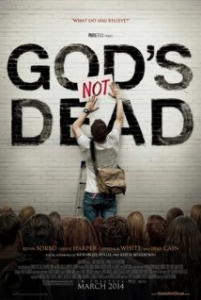I suppose it was inevitable. After their $2 million investment brought in $60 million worth of domestic earnings, Pure Flix has unsurprisingly turned to the screenplay writers of God’s Not Dead (GND) for a new film. Chuck Konzelman and Cary Solomon’s latest project, Do You Believe?, is slated to hit theaters in Spring 2015, with a cast that includes Cybill Shepherd and Lee Majors (yes, The Six Million Dollar Man will be replacing GND‘s Hercules and Clark Kent!).
My Patheos colleague Ken Morefield recently visited the set of Do You Believe? A couple of comments made by Konzelman and Solomon during the press conference attended by Morefield caught my attention. When asked about criticism leveled at their script for GND, they replied that “if they [love] you in the world, you’ve done something wrong.” When reminded that some of that criticism came from Christian critics (see here for one fine example), they used the tired slogan of “we’re the only army that bayonets their own wounded.”
Am I the only one who finds Konzelman and Solomon’s defensive responses entirely too convenient? Please allow me to break it down. Worldly critiques signify that you’re doing right in God’s eyes, so you’re a winner! Harsh words from fellow Christians mean you’re a maligned victim. Guess what? You’re still a winner in Heaven!
In light of this mindset, it’s safe to assume that for these two writers, GND‘s sizeable profit margin and the applause within the Christian fundamentalist subculture are simply earthly manifestations of divine approval. Hooray, winner again!
I was briefly tempted to write that it must be nice to live in such a hermetically sealed bubble of positive confirmation bias. But, no, it’s actually rather sad. Both personally and professionally, I’d much prefer to keep my ability to hear positive and negative feedback directed my way, without the damaging filter of a spiritual persecution complex. Given the heavy psychological armor (not to be confused with the Ephesians 6 “Armor of God,” by the way) worn by these two gents, I have little hope that Do You Believe? will be an improvement over the moral, aesthetic, and intellectual catastrophe that is God’s Not Dead.













